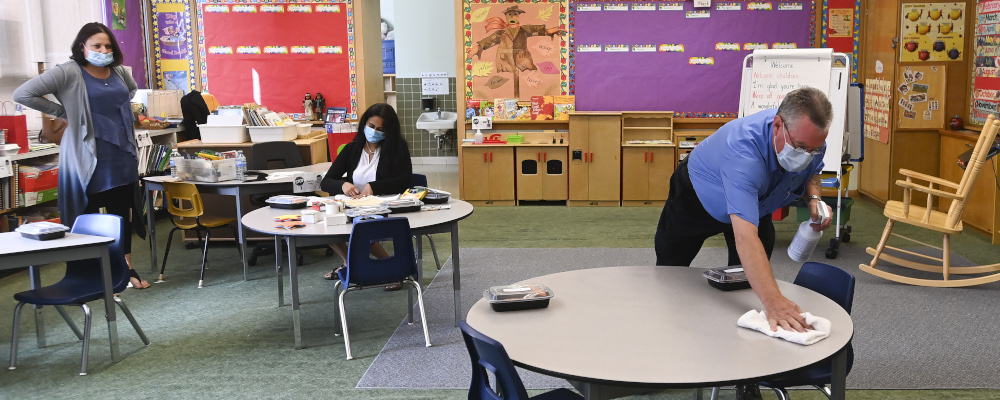Canada’s schools and the K-12 education system are weathering a profound crisis and, over the past 18-months, many certainties have dissolved in the face of the seemingly never-ending succession of COVID-19 disruptions.
Emerging out of the maelstrom, we are now in a better position to set aside a few “zombie ideas” in education.
Prevailing assumptions about mass schooling, ingrained beliefs about “minimally-guided” student learning, and idealized visions of 21st century learning have been severely tested and found mostly wanting. Out of the turmoil, our five million students and their teachers and families, are far more attuned to the impact and realities of “learning loss” and the current challenges of tackling the impact upon student achievement and well-being.
What’s most amazing is that a surprising, although diminishing, number of school administrators, education professors, and educators continue to deny the existence of student learning loss to the point where it may now qualify as the latest example of a zombie idea in K-12 education.
“Zombie ideas,” New York Times commentator Paul Krugman argues, are “beliefs about policy that have been repeatedly refuted with evidence and analysis but refuse to die.” Nine years ago, American education historian Larry Cuban, alerted us to their prevalence, especially in relation to popular and inflated claims about “online instruction.”
School closures have cost the “pandemic generation,” between eight weeks in Quebec to 24 weeks in Ontario of regular, in-class instruction. Prominent Canadian public policy analyst Irvin Studin, president of the Institute for 21st Century Questions, estimates that some 200,000 students, poor and affluent, have been “lost” or excluded from participation in any form of schooling.
Topsy-turvy pandemic education definitely left marginalized and special needs students more vulnerable. That is not in dispute, but there is still a residue of what might be termed learning loss denial, perpetuated mostly by education theorists and their allies imbued with romantic ideas once associated with “progressivism.”
A recent example of this Canadian education school of thought was the response to the “pandemic catastrophe” produced by University of Toronto Schools teacher Josh Fullan, echoing the sentiments of a vocal group of education faculty at the University of Ottawa. Fullan and the faculty of education contingent continue to see “silver linings” and urge schools to “honour what students gained amid the pandemic.”
Learning was disrupted and often imperfect, Fullan contends, but not lost. “Strong public systems,” “allies at school and home,” and the “adaptability of students” deserve more credit than they are receiving, according to Fullan. That is why he believes that phrases like “catching up” or “closing the gap” should be avoided and, rather remarkably, the term “learning loss” stricken from the lexicon in K-12 education.
Such assertions are simply outlandish on the heels of a global crisis affecting schools, students, teachers and families everywhere. Claiming that “learning loss” either doesn’t exist or is inconsequential (after 18-months of school disruptions) is one zombie idea without a shred of supporting evidence and one that refuses to die.
A profoundly important recent Ontario study, produced in June 2021 by Kelly Gallagher-Mackay and a team of Ontario Science Table university researchers, documented the extent of system-wide school closures and flagged the problem of learning loss, identified and being researched in education jurisdictions around the world.
While the researchers recognized the limitations of the current system-wide student assessment model, they noted the absence of any learning loss data in the province and identified the blind spot that compels researchers to utilize and apply research findings from other comparable jurisdictions. That simply would not be necessary if the zombie idea that learning loss doesn’t matter was not already heavily influencing the prevailing research agenda in our ministries of education and education faculties.
Closing provincial school systems for weeks on end has got to have some academic impact; otherwise, one might ask: if learning is so natural, why do we go to school in the first place? Without sound, reliable student assessment data, we can only assume that missing huge chunks of schooling, lurching back-and-forth into remote learning, and rapid adjustments to hybrid secondary school schedules, has already produced significant academic and psycho-social consequences for kids and teens.
Zombie ideas never seem to disappear in K-12 education. A few months ago, Bryan Goodwin, head of Denver research institute, McREL International, created quite a stir with an ASCD commentary identifying six zombie ideas that refuse to die. Learning styles, unguided discovery learning, whole word reading, and teach critical thinking rather than facts made that ignominious list. The peculiar fallacy that “learning loss is of no consequence” never occurred to him, likely because it’s so implausible.
School closures have cost the pandemic generation, from province-to-province, from eight to 24 weeks of regular, in-class instruction and thousands opted-out of any form of schooling. Surely that matters and will have consequences, down the line, for our elementary and secondary school-age students.
Recommended for You

DeepDive: Canada’s universities are failing to provide proper civic education. Here’s how Alberta can correct course

Paul W. Bennett: With AI taking over classrooms, it’s time to go old school again

Sam Routley: With DEI dustups and growing funding uncertainties, it’s fair to ask: what are universities for anymore?

Catharine Kavanagh: Independent schools are a huge positive for Alberta—if only the government can live up to its promises




